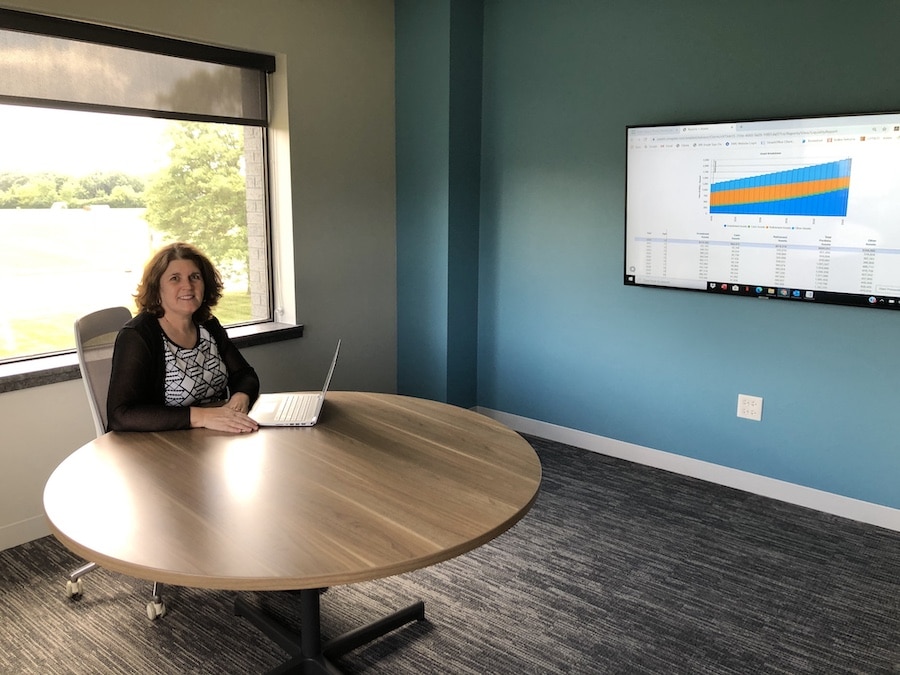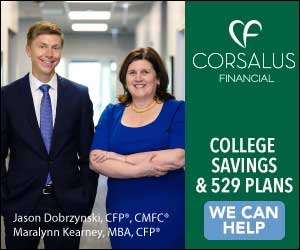As a parent, you likely spend most of your days and your energy doing things to keep your child(ren) safe and well-protected. Protecting your family can mean many things from child-proofing your house, teaching them about bicycle safety, and child-appropriate discussions of what it means to socially distance. It can also include actively building a financial safety net.
Two important aspects to financial well-being include building adequate emergency savings and creating a personalized financial plan to ensure you stay on track towards your personal financial goals.
This article is sponsored and written by our partners at Corsalus Financial. Jason Dobrzynski, CFP®, RLP®, CMFC® and Maralynn Kearney, MBA are local residents, financial advisors, and parents (Jason of a 2 year-old daughter and infant son, and Maralynn of three teenagers). We are honored that they offered to share their wisdom. You can connect with Jason and Maralynn on LinkedIn and Corsalus Financial on Facebook.

The importance of building adequate emergency savings
We all face unexpected situations in our life. In trying financial times, there are usually other accompanying life stressors such as a job layoff, an illness, or a large unexpected home repair.
From observing many clients go through challenging times, we learned that people who have built an emergency reserve of cash ahead of time are far less stressed. Having a cushion to fall back on helps tremendously during a crisis and allows you to focus on other aspects of the problem during this temporary setback until you can emotionally recover.
What’s the appropriate amount to have in an emergency fund?
We typically recommend to our clients to have anywhere from 3-6 months of their expenses in savings.
Conventional wisdom may tell you that having a bigger balance than that is always better, but in fact, it may actually be hurting you by taking away from more advantageous investment opportunities. The actual amount will be dependent on your personal situation and comfort level.
What we want to stress is an emergency fund provides the foundation to a sound financial plan.
Need to cover an unexpected expense? If you are under the age of 59 ½ and you’re looking to minimize penalties and fees, consider tapping your assets in this order but please consult with you financial advisor so you fully understand the pros and cons associated with taking money from any retirement plan accounts such as but not limited to an IRA or 401(k):
- Emergency Fund
- Taxable (nonretirement) investments
- Roth IRA contributions
- 401(k) loan
- IRA or 401(k) hardship withdrawal
- Credit cards
How do I rebuild after a financial crisis?
Time to rebuild? Once your crisis is behind you, it’s time to assess the situation and look to recover. Ask yourself, what did you learn from this experience? What is most important and why when it comes to your savings goals?
This may mean reestablishing your savings plan or putting a plan together to repay a loan. It may also mean being more disciplined with your future expenses because you are now even more motivated to save faster the next time around. After all, during these times of adversity, we end up being grateful for the things that we have and therefore end up having more in the end.

Stay on track towards your financial goals
We believe establishing a financial plan for your family is very important for your long-term financial success. Your personal plan should be a road map that you create to ensure that the decisions you are making today help keep you on the right path to meet your future financial goals, such as college funding and a retirement that does not require your financial dependence on your children.
In creating a comprehensive financial plan it’s very important to consider all aspects of your financial life, including your income, your savings and retirement accounts, your living expenses and your liabilities such as your mortgage, credit card debt or student loans. While this could seem overwhelming, it’s really not, especially with a qualified financial advisor to help guide you through the process. And, as a result you will have clarity in terms how much and where you should be putting away any extra money.
If you choose to work with a financial advisor to create your personalized plan, they will guide you through the necessary steps at a pace that works for you. Those steps depend on your financial situation, including assets you own, income you earn, expenses you have, and the goals you decide to set.
An advisor will typically begin by getting to know you and understanding what you hope to accomplish. From there, a gathering of your current financial information is necessary so that you and your Advisor can fully understand your current situation. After that, discussions begin to look at the path you are currently on, what changes you might want to consider to help ensure you meet your ultimate goals. You are in control through the process, and you decide what steps you want to take. The Advisor simply shows you the possibilities.
When you have a solid plan in place, either one that you personally built or one created with the help of a trusted advisor, it should provide the confidence and roadmap for you to follow. It might surprise you to see that your financial goals are not as unattainable as you may have thought. With a plan you can be in in control of your future based on the things you are actively doing such as saving consistently, or living within a budget you have established. Financial security and well-being are something that we wish for all of our loved ones, and we believe it is within your reach.

This article is meant to be general in nature and should not be construed as investment/financial advice or a recommendation of any kind. Investing involves risk, including the potential loss of principal. There is no guarantee that any investment or financial plan will be successful. Please consult your financial advisor prior to making financial decisions.
Securities and investment products and services offered through Waddell & Reed, Inc. (WRI), member FINRA/SIPC. Corsalus Financial is a separate entity from WRI.
Waddell & Reed is not affiliated with Kidlist. If you have questions for Corsalus Financial, please call or email: 630-954-4611 or corsalus@wradvisors.com. (07/20)














